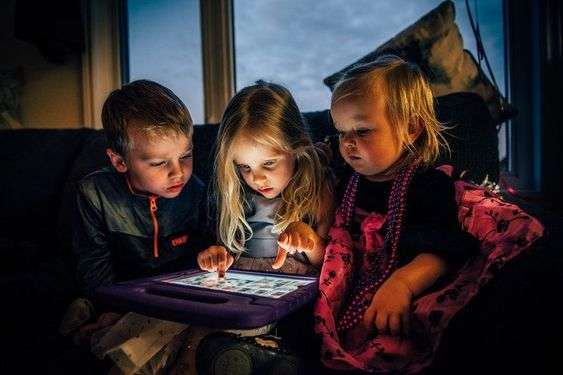Screen Time Can Be Good for Kids: Child Psychology, Screen Time Benefits
Table of Contents
- Introduction
- Understanding Screen Time
- 2.1. Types of Screen Time
- 2.2. The Evolution of Screen Time
- 2.3. Screen Time Guidelines
- Screen Time and Child Development
- 3.1. Cognitive Development
- 3.2. Social and Emotional Growth
- 3.3. Educational Opportunities
- Interactive Learning and Engagement
- 4.1. Educational Apps and Games
- 4.2. Virtual Museum Tours
- 4.3. Online Creativity Platforms
- Screen Time and Parental Involvement
- 5.1. Co-Viewing and Co-Playing
- 5.2. Setting Boundaries
- 5.3. Encouraging Critical Thinking
- Mitigating Potential Risks
- 6.1. Balancing Activities
- 6.2. Avoiding Excessive Screen Time
- 6.3. Monitoring Content
- Screen Time as a Tool for Learning
- 7.1. Blended Learning Environments
- 7.2. Digital Literacy
- 7.3. Preparing for the Future
- Conclusion: A Balanced Approach to Screen Time
1. Introduction
In today’s digital age, children are growing up surrounded by screens – from smartphones and tablets to computers and televisions. Parents and educators often worry about the potential negative effects of excessive screen time on children’s development. However, it’s crucial to recognize that screen time can be good for kids, and when used wisely, it can offer numerous benefits. In this comprehensive guide, we explore the world of screen time, its impact on child development, and how it can be harnessed as a valuable tool for learning and growth.
2. Understanding Screen Time
2.1. Types of Screen Time
Screen time encompasses a wide range of activities, from passive consumption of media to interactive learning experiences. We examine the various forms of screen time and their implications.
2.2. The Evolution of Screen Time
The nature of screen time has evolved significantly over the years, shaping the way children engage with technology. We explore this evolution and its impact.
2.3. Screen Time Guidelines
Leading health organizations provide guidelines for screen time use among children. We discuss these recommendations and their role in promoting healthy screen time habits.
3. Screen Time and Child Development
3.1. Cognitive Development
Screen time can positively influence cognitive development by exposing children to new ideas, problem-solving challenges, and diverse perspectives. We delve into how it can enhance cognitive skills.
3.2. Social and Emotional Growth
Contrary to concerns about social isolation, screen time can facilitate social and emotional growth through online interactions, empathy-building experiences, and exposure to diverse cultures.
3.3. Educational Opportunities
Screen time offers a wealth of educational opportunities, allowing children to explore topics of interest, access educational resources, and engage with interactive learning materials.
4. Interactive Learning and Engagement
4.1. Educational Apps and Games
Interactive educational apps and games can make learning engaging and fun. We explore the benefits of these digital tools for skill development.
4.2. Virtual Museum Tours
Virtual museum tours provide children with access to art, history, and culture from around the world. We discuss how these experiences can broaden their horizons.
4.3. Online Creativity Platforms
Online platforms for creativity, such as drawing and music composition software, empower children to express themselves and develop their artistic talents.
5. Screen Time and Parental Involvement
5.1. Co-Viewing and Co-Playing
When parents actively engage in screen time activities with their children, it strengthens bonds and promotes meaningful discussions. We highlight the importance of co-viewing and co-playing.
5.2. Setting Boundaries
Establishing screen time boundaries is essential for healthy usage. We offer practical tips for parents to set limits and create a balanced screen time routine.
5.3. Encouraging Critical Thinking
Parents can encourage critical thinking by discussing the content their children consume and helping them develop media literacy skills.
6. Mitigating Potential Risks
6.1. Balancing Activities
Balancing screen time with other activities, such as outdoor play and reading, ensures a well-rounded childhood experience.
6.2. Avoiding Excessive Screen Time
Excessive screen time can lead to negative effects. We provide strategies to avoid overuse and addiction.
6.3. Monitoring Content
Parents can play an active role in monitoring the content their children access to ensure it aligns with their values and age-appropriateness.
7. Screen Time as a Tool for Learning
7.1. Blended Learning Environments
Blending traditional and digital learning environments harnesses the advantages of both, preparing children for a technology-driven future.
7.2. Digital Literacy
Developing digital literacy skills is essential in the modern world. We explore how screen time can contribute to digital literacy.
7.3. Preparing for the Future
Screen time can equip children with skills and knowledge they’ll need in a rapidly evolving digital landscape, enhancing their readiness for future opportunities.
8. Conclusion: A Balanced Approach to Screen Time
In conclusion, screen time can indeed be good for kids when approached with intentionality and balance. Embracing the benefits of screen time while mitigating potential risks empowers children to thrive in the digital age. As technology continues to shape our world, a thoughtful and informed approach to screen time ensures that children reap the rewards while nurturing their overall development.
By fostering a balanced screen time routine, encouraging interactive learning experiences, and maintaining open communication, parents and educators can guide children towards a future where technology serves as a valuable tool for growth and exploration.
Do Follow Us On Twitter – https://twitter.com/Uniqverses708
We Have a Wide Range of Unique information For You On uniqverses.com
Please like, comment & Share if you want us to keep bringing these amazing and unique information for you.









